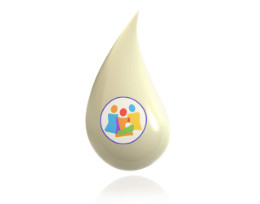Father/Partner Support During Lactation
Updated 04/22
PDF Version
A supportive father or partner plays a vital role in the success of breastfeeding. Studies show that when a breastfeeding or lactating parent has partner support, they lactate longer, and have lower risk of postpartum anxiety and depression. Here are some tips for partners to help:
- Praise your partner and give them positive feedback on what they are doing well.
- Help your partner eat well and drink plenty of fluids. Provide healthful snacks and prepare nutritious foods. When your partner sits down to breastfeed or pump, refill their water bottle, bring a snack, and ask if they need anything.
- Do the dishes, laundry, house cleaning, and provide care for other children.
- Arrange for a helper to come.
- Hold the baby skin-to-skin while your partner showers.
- Avoid suggesting a bottle. You may want to help fix things, but a bottle is often not the answer.
- Many times a support person will offer to feed the baby a bottle while the breastfeeding or lactating parent sleeps. If the infant is fed expressed breastmilk or formula from a bottle, it is best for the lactating parent to pump right before or after their stretch of sleep to avoid a long break from nursing or pumping. This can prevent a drop in milk production.
- There are many, many ways for fathers/partners to bond with their baby, and feeding is just one activity in this relationship! Talk to your baby- they are all ears! They are ready for socializing as soon as they are born. Babies crave attention from their parents through touching, singing, talking, laughing and just simple eye contact. Bathing, cuddling, slow dancing, skin-to-skin contact, and changing diapers are all activities that help fathers/partners bond with their babies.
- Try to be flexible. Babies grow and develop quickly, so their behavior will change from day to day. If only they could talk! Most babies don’t adhere to a schedule for very long. Being patient and flexible will help to keep stress low in the household.
- Sometimes a baby will prefer their mom or lactating parent and may not want to be held as often by the partner. This is temporary and it’s best to not force the issue. Keep offering cuddles and social interaction. Babies grow and change quickly – know that you and your partner can both form strong bonds with your infant as they grow and have a positive relationship with your child long term.
- Help care for older children. This is a great time to connect with older siblings, some of whom may be experiencing conflicted feelings about recent changes in the household.
- Your partner may face doubts and obstacles with breastfeeding such as worrying whether the baby is getting enough milk, and coping with daytime and nighttime feedings. This isn’t their problem alone- your firm support and assistance are priceless.
- If your partner is struggling, help them get help! Encourage them to call a lactation specialist or make that telephone call for her. Having a new baby is hard and the many physical and hormonal changes that a birthing and lactating parent go through can be overwhelming.
- It is normal for the birthing/lactating parent to experience baby blues, especially during the first month postpartum. If your partner is experiencing continued sadness, exhaustion or anxiety, it could be a sign of postpartum depression or anxiety. Other symptoms may include moodiness, appearing overwhelmed, loss of motivation, difficulty enjoying fun activities, lack of animation, loss or increase in appetite, difficulty sleeping, excessive weight loss or overeating, panic attacks, difficulty concentrating, decreased self-esteem, decreased interest in the baby, less interest in socializing, and wishing life would end. If you are concerned that your partner has symptoms of postpartum depression, gently encourage them to speak to her healthcare provider or help them schedule an appointment for evaluation.
- Also make sure to take care of yourself! The non-birthing/non-lactating parent can also experience postpartum depression and anxiety, and can be impacted by traumatic births. If you find yourself having any of the above thoughts or feelings, seek help and communicate with your partner.
- Postpartum Support International is a valuable online educational resource with connections to local mental health support.


